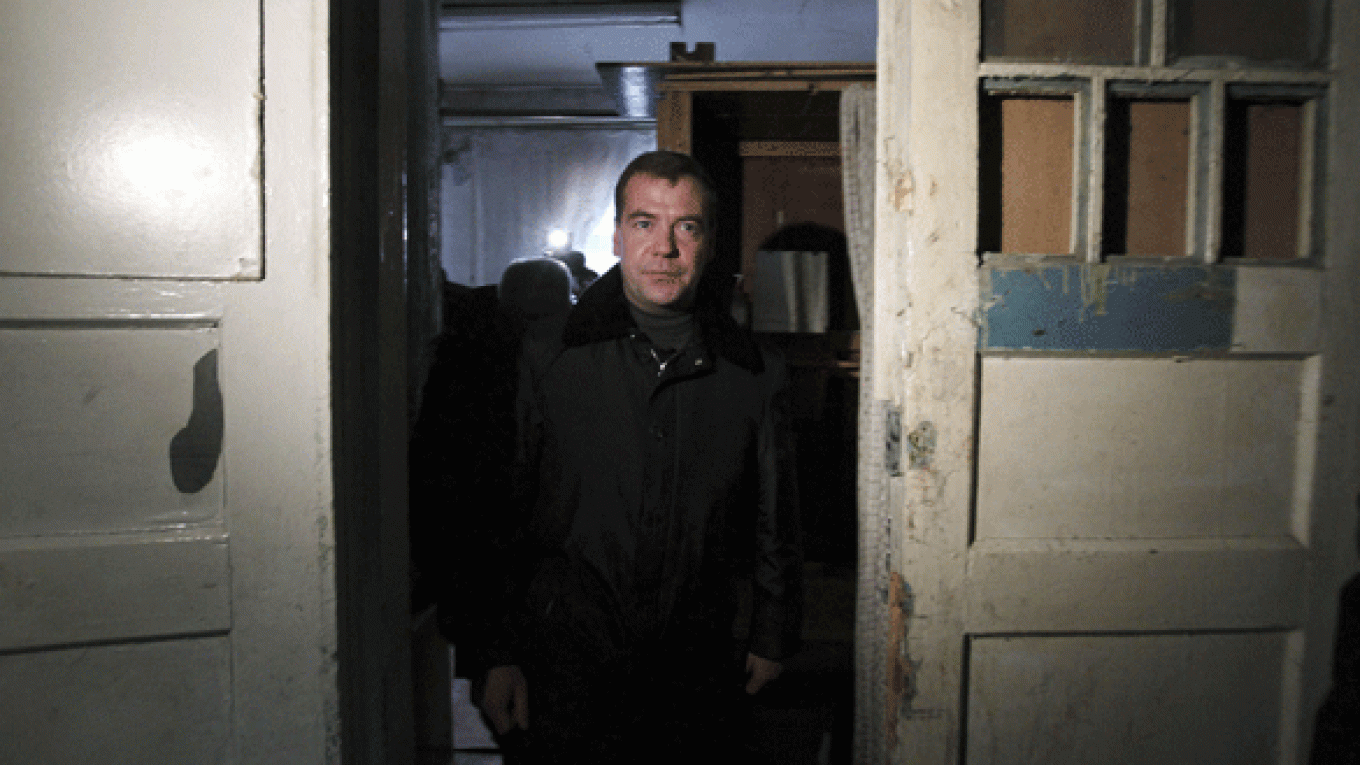President Dmitry Medvedev pushed for introducing antitrust regulations in housing construction in the regions on Tuesday, and criticized local authorities for patronizing some developers and limiting competition.
He also offered to provide low-income borrowers affordable state-guaranteed mortgages under special conditions.
Medvedev proposed to conduct antitrust checks of developers and introduce anti-monopoly regulations in residential construction in the regions due to noncompetitive practices by the authorities.
"I support the idea to involve the [Federal] Anti-Monopoly Service to check [developers'] market share in each specific region," he said at a meeting with activists of the ruling United Russia party in Yakutsk, Sakha republic, Interfax reported.
Medvedev added, however, that the regulations should not be introduced everywhere because "there are regions where one can't attract developers" due to the small size of the market and low incomes.
He pointed out that the situation in many regions largely depends on the regional authorities, as governors often patronize some developers to the detriment of others.
"We are all aware of these situations very well, starting from relatively small places to capital regions," Medvedev said without providing names.
It is essential to focus on eliminating corruption among officials rather than investigating developers, said Oleg Repchenko, head of the IRN.ru real estate portal, since the companies, which have the support of regional or city authorities, are often in an advantageous position.
"A monopoly exists on the level of the city authorities, which allot land and provide [construction] permits," he said by telephone.
Alexander Dorovsky, deputy head of the Federal Anti-Monopoly Service's public utilities and construction department said city authorities often provide plots of lands for construction directly to the developers they patronize, without organizing a tender.
The competition watchdog has been monitoring the procedures for providing land plots in the regions since 2005 and has discovered 240 such violations over the last couple of years, opening antitrust cases, he said by telephone.
Violating the rules on providing land plots limits competition on the construction market, Dorovsky said, adding that the watchdog will continue to monitor the situation.
Some developers welcomed Medvedev's proposal, saying the authorities' opaque decision making in construction projects is rather widespread.
"Until recently, distributing state orders for construction and signing investment contracts with a small clique of developers in Moscow has been, mildly speaking, nontransparent," said Igor Ulyanov, a spokesman for Zhilishchny Kapital, a developer working in Moscow and the Moscow region.
Former Mayor Yury Luzhkov is widely known for favoring Inteko, owned by his wife Yelena Baturina — who sold the company shortly after Luzhkov's dismissal last year.
Ulyanov said construction companies hope that the new city authorities will change the situation for the better.
"The market players hope for setting honest game rules and a clear policy in construction in Moscow," he said in e-mailed comments.
Introducing antitrust regulation in real estate development would be "a strategically proper measure," which would ensure "preserving a healthy construction market in Russia," said SU-155, which has projects across the country.
Medvedev also suggested that affordable mortgages be provided for low-income workers, like teachers and doctors, saying the state could provide guarantees for such loans and buy mortgage-backed bonds.
"A special mortgage product should be created for people without high incomes because they don't have enough finances to use standard mortgages," said Medvedev, who visited a few apartments in run-down houses in Yakutsk, RIA-Novosti reported.
Both Medvedev and Prime Minister Vladimir Putin have been pushing for affordable mortgages, saying the mortgage rates must be lowered to 5 percent from 6 percent.
But Repchenko of IRN.ru said people would like housing prices to decrease rather than getting affordable mortgages.
"Everyone would … buy housing without taking a mortgage if housing cost less," he said.
A Message from The Moscow Times:
Dear readers,
We are facing unprecedented challenges. Russia's Prosecutor General's Office has designated The Moscow Times as an "undesirable" organization, criminalizing our work and putting our staff at risk of prosecution. This follows our earlier unjust labeling as a "foreign agent."
These actions are direct attempts to silence independent journalism in Russia. The authorities claim our work "discredits the decisions of the Russian leadership." We see things differently: we strive to provide accurate, unbiased reporting on Russia.
We, the journalists of The Moscow Times, refuse to be silenced. But to continue our work, we need your help.
Your support, no matter how small, makes a world of difference. If you can, please support us monthly starting from just $2. It's quick to set up, and every contribution makes a significant impact.
By supporting The Moscow Times, you're defending open, independent journalism in the face of repression. Thank you for standing with us.
Remind me later.


